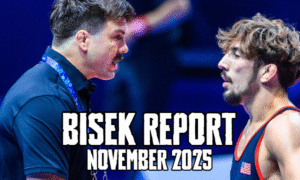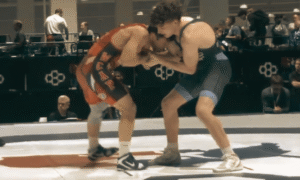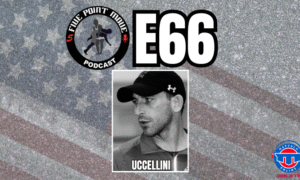“He was my best friend, so I want to keep him with me.”
We carry torches. Their metaphorical flames flickering towards a sky we are told to reach for. An honest assessment appears to remind us that this is not a selfless endeavor, but it’s okay — healing is involved here. Being burdened to the human condition does not mean the sum of what we are is realized in feeling, but in doing. In moving on, in finding intention for today. Those who are missed on this path for purpose are not gone. They remain present in the fire burning within our hearts.
So we carry torches.
A few familiar elements are part of this story. You know the kind. Boy wrestles. Boy leaves home and becomes a man. The man returns home to give back by going into coaching. Wrestling is long on tales of this nature, a carousel of memories and hard lessons, defining victories intermingling with crushing defeats. Blurry becomes the picture until one day, an all-encompassing principle introduces itself to clear the lens and provide the basis from which the rest of your life seems destined to be lived. Sure, it can be about “giving back”, so long as you, too, are on the receiving line.
For Joe Uccellini of the Curby 3-Style Wrestling Club in Troy, New York, he is repaid by repaying. A graduate of the original Northern Michigan University Greco Roman program under famed United States Greco coach Ivan Ivanov, the New York native found that staying involved was a natural extension of his life-changing experience in wrestling.
“I was basically forced to retire from wrestling due to shoulder surgery, so I moved home when I could no longer compete for Northern Michigan,” Uccellini explains. “After being influenced by Ivan, I didn’t want to give up on wrestling because it was such a huge part of my life.” Thus, the man returned home to the area where he grew up. Despite having previously acquitted himself in international competition, Uccellini had to build his new career from the ground up. It started with a small gig at nearby Hudson Valley Community College, an institution that only fielded a club-level team. Even still, it was a beginning.
Former two-time US National Champion Van Fronhofer, a professor at Hudson Valley, encouraged this new direction, but was unable to devote the same amount of time as Uccellini, who began holding practices in his home. “We have a 2,000 square foot basement with mats and wall mats from Edge Hoboken”, says Uccellini. “We had practices daily with 10-15 wrestlers from the area and word of mouth started kicking in. When my wife, who is a massage therapist and was also working out of the house, stopped recognizing who was showing up, we had to have a conversation.” The home-based wrestling school quickly outgrew itself, leading Uccellini and his wife, Ashley, to look for a more suitable space. Once that was finalized, it was all about the name for the new venture.
A Name to Fit the Place
“The story of Jacob Curby is incredible in and of itself,” Uccellini declares. “I couldn’t do it justice telling it but I try for my kids, I really do.” The United States wrestling community, particularly on the Greco Roman side, was rocked to its core when the 25-year old Curby suddenly passed away in January of 2010. The news hit the Northern Michigan family especially hard. Curby, a pillar of the NMU program, had come into his own on the national scene and was a serious contender in the midst of an Olympic quadrennial. Current and former teammates struggled to reconcile his untimely departure including Uccellini, who had forged an unforgettable bond with Curby when the two were roommates. “Getting the news from Jake Fisher the night of his passing was the worst phone call I’ve ever gotten, and I wanted to keep him with me.”
One way to do that was to christen his new wrestling club appropriately and all that took was a phone call. “I called Dr. David Curby, Jake’s dad, and asked him if I could name it after Jake, who was my best friend and the wrestler who changed my life. He gave his blessing and he’s been super-supportive.” The name, Curby 3-Style, is representative of the three primary styles of wrestling practiced in the US — folkstyle, freestyle, and Greco Roman. “We started in 2014 and during that year I was an All-American for the first time. I realized I was happy with my career, having achieved something I had been waiting since childhood to do. Now I wanted to feel the rush through my wrestlers by helping them become All-Americans.”
He’s off to a promising start. One of his wrestlers, Zoe Gress, won a national championship this year and will be participating in the very first Schoolgirl Pan American Games in Medellin, Columbia next week. “She’s such an amazing talent, she hits arm spins, headlocks…she’s Greco first even though she competes in freestyle,” Uccellini says proudly. Another one of his athletes, Kevin Parker, was a freestyle national finalist and Greco All-American. He will be wrestling this season at Princeton University, the alma mater of his brother Greg, who was an NCAA Division I runner-up.
Curricular Differences
The legendary US Greco Roman coach Joe DeMeo looms large in Uccellini’s mind. Coming up, Uccellini wrestled under DeMeo through the Adirondack Three-Style Wrestling Association, so it’s only natural he wears that influence on his sleeve at Curby. “We use Coach DeMeo’s template. He wouldn’t teach a technique and its counter too much in a practice. For the first two months it’s technique with a little drilling. Then it is drilling and live wrestling the closer we get to Fargo.” Like most American wrestling academies, Curby offers folkstyle in the fall and winter months with one notable exception: live wrestling is not a big part of the folk format. Instead, Uccellini and his staff put a focus on technique using film study and drilling. “We don’t want to burn the kids out before their state tournaments,” Uccellini says.
Greco Roman positioning and techniques are in the coach’s DNA, giving wrestlers at Curby 3-Style a full taste of what is to come following folkstyle season. Good thing, too: from March through August, there is zero folkstyle being practiced inside of the club. It is all Greco and freestyle with an accentuation on the former. Uccellini is adamant about the focus on the international styles because he feels that is where the future is. “Me as a developmental coach, my job is to help these kids realize they can have a career in Greco especially after high school or college. It is part of our curriculum — wrestling doesn’t end after your senior year, there are opportunities at Northern and opportunities elsewhere to continue your Olympic dreams.”
As such, during the spring and summer Curby athletes do not attend a single folkstyle tournament. To do so would be counter intuitive to the overall goal according to Uccellini. “We want to win at Fargo and put people on the podium every year.” That means entering his wrestlers in Greco and freestyle tournaments virtually every weekend throughout the area, which includes treks to New Jersey, Pennsylvania, and Connecticut. “Wherever there is a tournament in our area, we go to it.”

Uccellini uses first-hand experience to teach wrestlers the value of Greco Roman skills. (Photo: Joe Uccellini)
A Personal Touch
Aside from a healthy dose of Greco-Roman technique, another separating point between Curby 3-Style and other clubs is that the head coach places an unusual concentration on providing individual attention. This approach is not contrived, but rather, a mechanism for Uccellini to reach athletes the way he would want to be reached. “I want to make sure I know all of my wrestlers. If they are struggling, I can help because I was someone who struggled, too. I wasn’t a blue-chip wrestler, so I want to find out what it is that might be holding them back.” The result has been an overwhelming amount of positive feedback from parents of athletes. Parents know that their kids are receiving the attention they need and also, that it is coming from someone who understands the value of face time.
“It’s not like the kids were just numbers for DeMeo or Ivan, but it was a higher level so they needed to focus on their top guys. It is my responsibility to allow that development with a lot of one-on-one coaching, and I like that people say it’s my personality along with the technique that differentiates Curby from other clubs.”
To better serve its growing clientele of wrestlers, Curby 3-Style is moving to a full-time schedule. The club will now be open throughout the day every day for wrestling practices and fitness classes. It might seem like an aggressive move but to Uccellini, it is one that became required due to the expansion of his roster. “We decided that the club is growing at a certain pace where we need a 4:30 class, we had 60 kids in the room, which fits 50 comfortably. I don’t want to lose wrestlers and fitting with my mission statement of one-on-one coaching, we’re adding extra time for our kids. We are also adding Senior-level practices during the day so we can develop our Senior team.”
In just a few short years, the Curby 3-Style Wrestling Club has established itself as a hallmark institution that knows how to navigate the balance between offering the deeply-rooted American folkstyle wrestling and advancing the Olympic movement — something Greco Roman needs perhaps now more than ever. It is an exciting time for Uccellini and the facility. A lot has happened, and more opportunities will continue to present themselves. Just this past summer, his club hosted the inaugural “Headlocks on the Hudson” event, a tournament featuring both Greco and freestyle. It was a big success even though, it came with a wrinkle. “We did Greco first. Typically, you’d wrestle freestyle first and people would leave before Greco. Everyone got three matches and if wrestlers didn’t want to compete in Greco, we put their names in the bracket to show they forfeited to their opponents.” This wasn’t to scapegoat, but to encourage wrestlers to give it a try.
“Team Canada was going to forfeit all of their matches but wound up saying, You know what? We’re going to wrestle. And after the tournament, the coach from Canada said they were glad they wrestled Greco. It accomplished what I believed it would, which is that people were nervous about something they didn’t know but if they tried it, they would like it. We were at six mats this year and next year we are doing ten in an outdoor setting once again.”
The value of a lesson well-learned
It all comes back to the name. Uccellini can’t help but bring it up every available opportunity. This might be about a wrestling club, and it is. One that prominently showcases Greco, no less. But the etching is so thickly-carved, there is no escaping that there is something else simmering beneath the surface of his words as he passionately relays all of the details surrounding the new developments in store at his school. Uccellini wants kids to learn how to wrestle the way he did. He also wants them to understand what this all stands for. Remember, there are lessons learned and sometimes, the teacher is sent to you by someone else somewhere else and it becomes your life’s work to get that across to those who matter most.
“There are kids who want to give up. Jacob didn’t tell me he had epilepsy, he didn’t tell me he had leukemia in high school. I found out because he had a seizure one night in our dorm room on my birthday freshman year. I was shaken up, I had never seen it before. I asked him the next day, ‘Dude, why didn’t you tell me?’ He said, ‘I didn’t want your sympathy.’ Jake wanted to focus on becoming successful, he didn’t want excuses. He had a million excuses, he didn’t want any of them.”
The impact was far-reaching enough to where Uccellini, once caught in the traditional trappings of collegiate partying, underwent a nearly-instantaneous metamorphosis. His own potential, once hindered, started to emerge. He credits his NMU roommate with the reason why. “I changed my entire outlook on training and perspective on what actual struggle is. We became best friends and I transformed into a completely different person after meeting him. He’s had a profound influence on my life to this day.” It’s important to focus on what was being taught, even if the class took place in a dorm or on a wrestling mat. Everything can change when the right person at the right time enters the picture.
“I have a tattoo of Jacob wrestling (Mike) Ellsworth on my left leg, Ellsworth was drawn as an angel, so it’s Jacob wrestling an angel. Now I have this club and I get calls from national-level wrestlers who want our shirts because they love Jacob Curby. It’s just a way to keep celebrating a life that was special to the sport of Greco Roman wrestling.”
Maybe this isn’t the typical setting with wrestling characters straight out of central casting, plot lines scribbled recklessly around a narrative featuring some iron-headed hero who knows how to tough it out to win the big match or get strong enough to crack the starting lineup. You cannot spin Curby’s and Uccellini’s story this way because it doesn’t jive. The wrestling club that is growing in leaps and bounds is built upon the reminder that you are worth your own effort. That helping others believe in themselves is the ultimate accomplishment.
Uccellini is proof of this. And just recently, he received further evidence that he’s got the right idea.
“Dr. Curby called me today, he just bought the domain for Curby 3-Style Wrestling Club in Illinois and he asked me if he could have his own club out there. I said, ‘You are the father of the man. You did a great job raising your kid and I’m honored.’ He said he was proud of what we are doing and wants to be a part of it, so we’re going national as far as I’m concerned.”
They won’t be alone.
They never were.


















